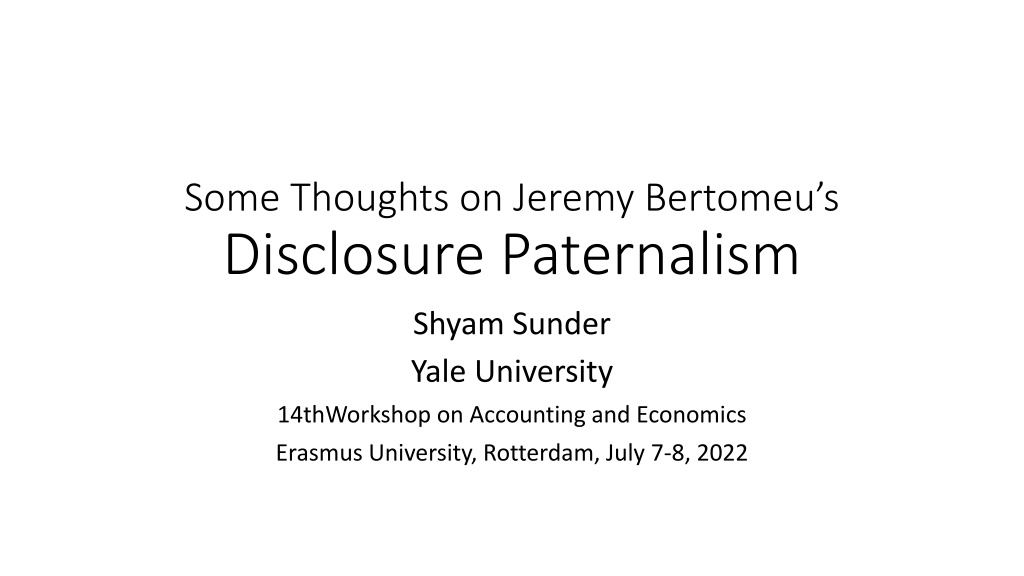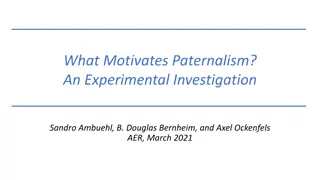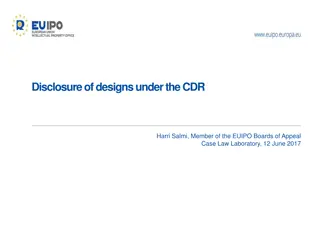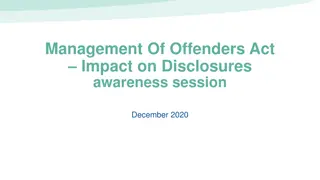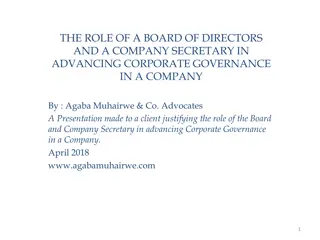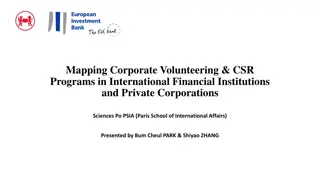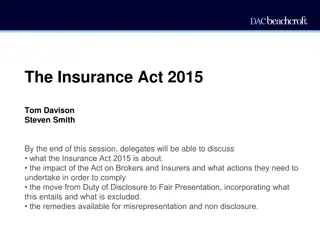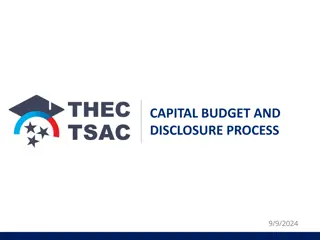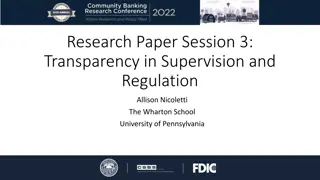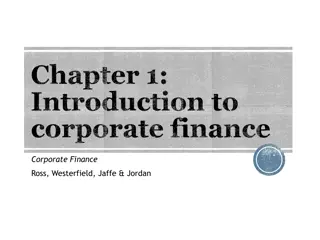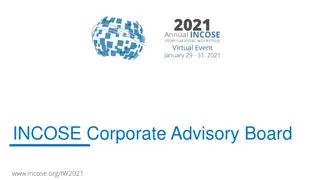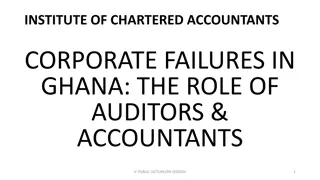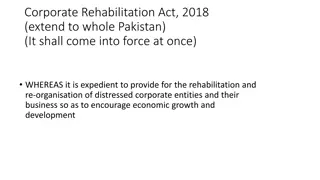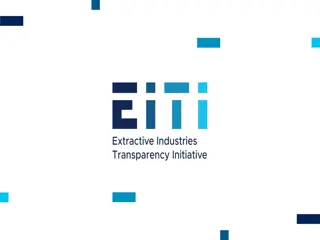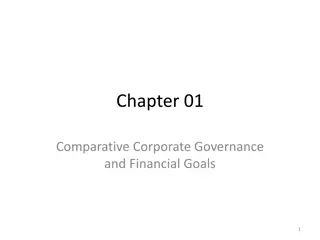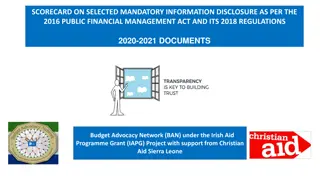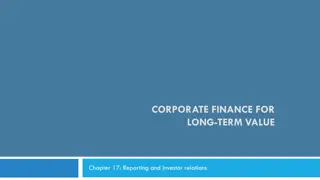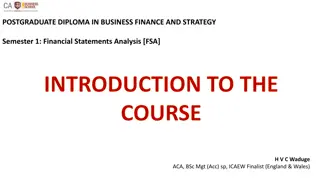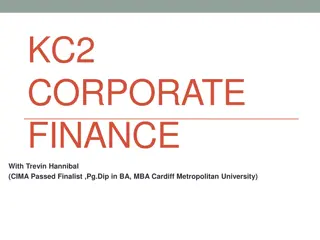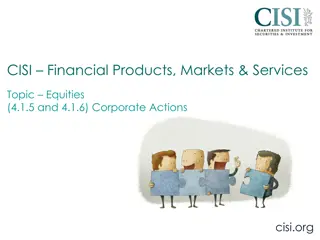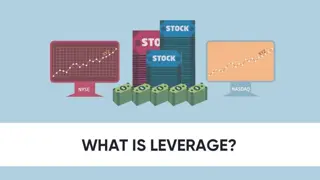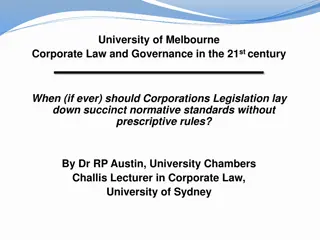Understanding Paternalism in Corporate Financial Disclosure
Regulatory paternalism in corporate financial disclosure can offer short-term benefits to investors but may lead to long-term harm. Jeremy Bertomeu's analysis explores the implications of applying parental metaphor to regulatory practices in corporate reporting. The balance between protecting investors and fostering independent decision-making poses critical trade-offs that impact market behavior and regulatory outcomes.
Download Presentation

Please find below an Image/Link to download the presentation.
The content on the website is provided AS IS for your information and personal use only. It may not be sold, licensed, or shared on other websites without obtaining consent from the author. Download presentation by click this link. If you encounter any issues during the download, it is possible that the publisher has removed the file from their server.
E N D
Presentation Transcript
Some Thoughts on Jeremy Bertomeus Disclosure Paternalism Shyam Sunder Yale University 14thWorkshop on Accounting and Economics Erasmus University, Rotterdam, July 7-8, 2022
An Overview An Overview Regulatory paternalism can help the investors in the short run; but hurt them in the longer run. So, be careful; even benign protection may inflict more harm than good to the targets Application of the principle to corporate financial disclosure
Paternalism Paternalism Rooted in the role of parents in raising a child. Books on what parents should or should not do. Feeding, visual and verbal engagement, assistance in learning to walk, and administration of bitter medicine over protestations of the child You must take the training wheels off (and risk a few falls and injury) if you wish your child to learn to ride a bike. Jeremy Bertomeu s paper applies this metaphor to analyze of consequences of regulation of disclosures in corporate financial reporting.
Dictionary/Encyclopedia Definitions Dictionary/Encyclopedia Definitions The policy or practice on the part of people in positions of authority of restricting the freedom and responsibilities of those subordinate to them in the subordinates' supposed best interest. The interference of a state or an individual with another person, against their will, and defended or motivated by a claim that the person interfered with will be better off or protected from harm when they are less than fully rational. The government requires people to (1) Contribute to a pension system (Social Security); (2) motorcyclists to wear helmets; (3) forbids people from swimming at a public beach when lifeguards are not present; (4) forbids the sale of various drugs deemed to be ineffective; (5) forbids the sale of various drugs believed to be harmful; (6) does not allow consent to certain forms of assault to be a defense against prosecution for that assault.
Trade-Offs paternalism that insulates investors from excessive optimism will cause them to make more mistakes in the long run. Importance of critical trade-off between this long-run disadvantage in learning by one-self, and the short-run advantage that might accrue from paternalistic supervision and correction by a benign regulator Are Robinhood day-trading, GME and crypto phenomena a consequence of eight decades of paternalism in security markets? Some people will trade any way, but the scale might be related to paternalism (more broadly, beyond regulation of disclosures) regulation in the domain of disclosure in financial reporting.
Intent of Regulators Can we safely assume regulators intent to be benign, i.e., protecting shareholders from their errors? Counter-arguments Revolving door personnel Regulatory capture (Stigler) Bureaucratic imperatives (must write regulations)
Managerial Motives for Non-Disclosure Hide bad performance (delay being fired) But also, guidance to investors who may over-react to changes that the manager knows are transient shocks Does income smoothing, whether nominal or real, hurt or help the investors? Fukui s argument.
Information Asymmetry The paper proposes to view corporate financial reporting mandates as a form of paternalism (1) corporate managers would prefer not to have disclosure requirements so they can decide when, what, and whether to disclose. Justifiable paternalism demands information asymmetry in favor of the parent or the regulator in this case Without asymmetry, the argument for paternalism is less straight forward In common cases of paternalism two parties are involved Three in financial reporting: investors, managers and the regulator. Information asymmetry favors the manager, and not the parent (regulator) Regulator s challenges: Knightian uncertainty about manager s state and action space and information Will regulator s duty of loyalty to the investors dominate potential regulatory capture
Means-End Heuristics and Convergence Convergence overtime to transparency calls for stable environment and organizational structure of the firm Will this condition hold for replications sufficient for convergence? Under Knightian uncertainty of our socio-economic lives, what options other than adaptive behavior do we have? Little evidence from empirical data gathered from a large variety of contexts that adaptive behavior, labeled means-end heuristic by Newell and Simon in their pioneering work, is the norm. This evidence has led, some behavioral scientists to argue that such individual behavior may be optimal given their circumstances
Knights Uncertainty and Savages Large Worlds The state space and the associated probability distributions rarely known to decision makers (except in casinos and our textbook examples) Our lived-in natural and social world are large (vs. small in Savage Foundations of Statistics. Markets for stocks, or shampoos, do not have a given, fixed, or known state spaces or probability distributions (disastrous results of apply Markowitz portfolio selection to data) Economic agents are always discovering, learning and conjecturing about the changing world we live in Is it useful to label our failures to make the right conjectures an error?
Knowledge and Divisibility of State Space What is the state space of corporate reporting game? Is it fixed, known, or knowable? Is it possible to write financial regulations that cannot be frustrated by (managerial) innovation in state space (e.g., through design of new transactions, instruments, contracts and organizational arrangement by adding contingencies (Dye, Glover and Sunder 2016) Knight s uncertainty and Savage s Large Worlds Information economics revolution following von Neumann- Morgenstern essentially ignored these issues (until quite recently, Binmore and others)
Structural Rationality: Efficient Equilibria from Imperfect Individual Actions Be careful in assuming the aggregate properties derivable from properties of component parts, especially in regulation Simple markets populated with profit motivated human traders disseminate information (Plott and Sunder JPE 1982) Simple markets for Arrow-Debreu state-contingent securities populated with profit motivated human traders aggregate diverse information (PS Econometrica 1988) We do not know what makes such outcomes possible Recent results: similar markets populated by simple heuristic algorithmic traders also tend to achieve comparable results (JMS 2016, 2022) Emergence from complex interactions among parts can generate different outcomes
Embodied Cognition One final thought. An essential consideration in the paternalism model of disclosure is characterization of human cognition following the model developed since the mid-twentieth century Past quarter century of developments have tended to re-characterize cognition with qualifiers such as embodied or embedded cognition The basic idea is that cognition is not delimited to brains, and includes not only the rest of the body, but also aspects of the environment outside the body These broader concepts of cognition give rise to the possibility that complexity and emergence may account for the absence of analytically derivable mapping from micro or finer grain phenomena to macro or coarser grain phenomena (Mousavi and Sunder 2022).
Some Shared Thinking Jamal, K., M.S. Maier, and S. Sunder. 2022. Emergence of Information Aggregation to Rational Expectations Equilibria in Markets Populated by Biased Heuristic Traders, Yale University working paper (revised July 2022). Mousavi S and Sunder S. 2022. Emergence and Embodiment in Economic Modeling. Frontiers of Psychology (Cognition). 13:814844. doi: 10.3389/fpsyg.2022.814844. Plott, Charles R. and Shyam Sunder. 1988. Rational Expectations and the Aggregation of Diverse Information in Laboratory Security Markets. Econometrica 56, no. 5 (September 1988): 1085-1118. Reprinted in The Legacy of Robert Lucas, Jr. edited by Kevin D. Hoover. London: Edward Elger Publishing, 1999. Abstract Text (PDF). Reijula, Samuli, Kuorikoski, Jaako, Ehrig, Timo, Katsikopoulos, Konstantinos, and Shyam Sunder. 2018. Nudge, Boost or Design? Limitations of behaviorally informed policy under social interaction. Journal of Behavioral Economics for Policy, Vol. 2, No. 1, pp. 99-105. Shyam Sunder. 2021. Uncertainty and Probability: A Century Since Knight and Keynes, Yale School of Management Faculty Research Workshop, September 29, 2021. Powerpoint. Video.
Thank You. Shyam.sunder@yale.edu https://faculty.som.yale.edu/shyamsunder/research/
